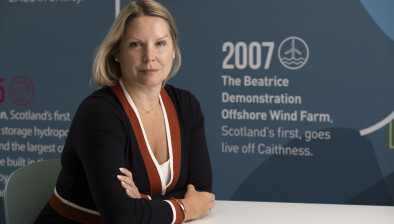Strategy to deliver ‘just transition’ for energy sector published

Net zero & energy secretary Michel Matheson
A route map to secure Scotland’s fastest possible fair and just transition away from fossil fuels has been published by the Scottish Government.
The draft ‘Energy Strategy and Just Transition Plan’ sets out a plan for Scotland’s renewables revolution to be accelerated as North Sea basin resources decline.
This would result in a net jobs gain across the energy production sector, with the potential to increase renewable energy exports and reduce exposure to future global energy market fluctuations.
Key policy proposals published for consultation include:
- substantially increasing the current level of 13.4 Gigawatts (GW) of renewable electricity generation capacity, with an additional 20 GW by 2030, which could produce the equivalent of nearly 50% of current demand
- an ambition for 5 GW of renewable and low-carbon hydrogen power by 2030, and 25 GW by 2045
- increasing contributions of solar, hydro power and marine energy to the energy mix
- generation of surplus electricity enabling export of electricity and renewable hydrogen to support decarbonisation across Europe
- setting out final policy positions on fossil fuel energy, including consulting on a presumption against new exploration for North Sea oil and gas
- accelerated decarbonisation of domestic industry, transport and heat in buildings
- increasing access to affordable energy by urging the UK Government to take stronger, more targeted action for fair energy market reform
- maximising household, business and community benefit from energy projects, including through shared ownership of renewables
Published as part of the draft Energy Strategy is a Just Transition Plan for the energy sector. This details the support being provided to grow Scotland’s highly skilled energy workforce, increase jobs in energy generation and the supply chain, while enabling communities and businesses, particularly in the North East, to prosper.
Analysis shows the number of low carbon production jobs is estimated to rise from 19,000 in 2019 to 77,000 by 2050 as the result of a just energy transition, meaning there will be more jobs in energy production in 2050 than there are now.
The Strategy also sets out recommended actions for the UK Government to take in reserved policy areas, including powers relating to energy security, market mechanisms, network investment and market regulation.
Scottish Ministers have invited the UK Government to join an Energy Transition delivery group to drive forward the vision set out in the Strategy.
Net zero & energy secretary Michel Matheson said: “Scotland is an energy rich nation, with significant renewable energy resource, a highly-skilled workforce and innovative businesses across a globally renowned supply chain.
“The renewables revolution is global, as all countries seek to address concerns about climate change, and Scotland is at the forefront of this transition.
“At a time of unprecedented uncertainty in our energy sector, accelerating the transition towards becoming a renewables powerhouse makes sense for a number of reasons – particularly to helping to mitigate against future global market volatility and the high energy prices which are making life so difficult for so many people across Scotland. For example, onshore wind is one of the most affordable forms of energy.
“While we do not hold all the powers to address these issues at source, this Strategy sets out how we can achieve an energy transition that ensures we have sufficient, secure and affordable energy to meet our needs, support Scotland’s economic growth and capitalise on future sustainable export opportunities.”
Just transition minister Richard Lochhead said: “The oil and gas industry has made a vast contribution to Scotland’s economy and its workers are some of the most highly-skilled in the world. But Scotland’s oil and gas basin is now a mature resource.
“A just transition to a net zero energy system will secure alternative employment and economic opportunities for those already working in the industry and will provide new green jobs in Scotland for future generations. Embracing this change will ensure we avoid repeating the damage done by the deindustrialisation of central belt communities in the 1980s.
“There is a bright future for a revitalised North Sea energy sector focussed on renewables.”
Responding, Scottish Renewables’ director of policy Morag Watson said: “The Scottish Government’s draft Energy Strategy and Just Transition Plan are bold, ambitious and potentially transformative pieces of work, and are to be welcomed as another important piece of the net-zero puzzle.
“We are particularly encouraged by the government’s commitment to consult on increasing our ambition for offshore wind power and setting targets for solar and tidal and wave energy generation.
“We must however remember that many barriers still stand in the way of our industry’s continued development, and that we need strong action – and all renewable energy technology options on the table - as we develop the low-carbon energy system of the future.
“Finally, Scottish Renewables asked The Scottish Government to enhance export support for Scottish suppliers and are pleased to see a renewables export plan will be published in early 2023.”















